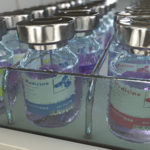 On July 2, 2024, the U.S. Food and Drug Administration (FDA) approved Kisunla™ (donanemab-azbt, 350 mg/20 mL once-monthly injection for IV infusion) for adults with early symptomatic Alzheimer’s disease (AD) and people with the mild dementia stage of AD, with confirmed amyloid pathology. Donanemab (LY3002813) is a humanized IgG1k monoclonal antibody that targets Ab(p3-42), a pyroglutamate form of amyloid beta that is aggregated in amyloid plaques. Donanemab was granted Breakthrough Therapy designation by FDA for the treatment of AD.
On July 2, 2024, the U.S. Food and Drug Administration (FDA) approved Kisunla™ (donanemab-azbt, 350 mg/20 mL once-monthly injection for IV infusion) for adults with early symptomatic Alzheimer’s disease (AD) and people with the mild dementia stage of AD, with confirmed amyloid pathology. Donanemab (LY3002813) is a humanized IgG1k monoclonal antibody that targets Ab(p3-42), a pyroglutamate form of amyloid beta that is aggregated in amyloid plaques. Donanemab was granted Breakthrough Therapy designation by FDA for the treatment of AD.
FDA’s approval was based in part on results from the TRAILBLAZER-ALZ 2 Phase 3 study in which 1736 patients with early symptomatic AD with amyloid and low/medium or high tau pathology were randomized 1:1 to receive IV donanemab (n=860) or placebo (n=874) Q4W for 72 weeks. [1] Trial participants were analyzed over 18 months in two groupings: one group who was less advanced in their disease (those with low to medium levels of tau protein) and the overall population. Treatment with Kisunla significantly slowed clinical decline in both groups, with people who were the least advanced in the disease experiencing the strongest results with Kisunla.
- Sims JR, Zimmer JA, Evans CD, Lu M, Ardayfio P, Sparks J, Wessels AM, Shcherbinin S, Wang H, Monkul Nery ES, et al. Donanemab in early symptomatic Alzheimer disease: The TRAILBLAZER-ALZ 2 randomized clinical trial. JAMA. 2023;330(6):512-527. doi: 10.1001/jama.2023.13239.


